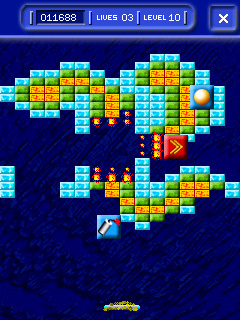|
|
Chris De Herrera's Windows CE Website |
|---|---|
About |
|
| By Chris De Herrera Copyright 1998-2007 All Rights Reserved A member of the Talksites Family of Websites Windows and
Windows CE are trademarks of
Microsoft All Trademarks are owned |
Arkaball Review
By Allen Gall,
Copyright 2002
Revised 11/12/2002
[an error occurred while processing this directive]
Soviet software developer SPB (known primarily for their Palbum image file
viewer) has released a breakout game by the name of Arkaball.
As the title indicates, the game makes no pretense about being
anything other than a simple Arkanoid clone.
That's actually a good thing in this case, since it allows the game
to focus on what makes breakout games fun: keeping the ball in play,
collecting good power-ups and avoiding bad ones, and losing yourself in a
Zen-like trance while you �break out� the barrier.
(Incidentally, one of the first breakout games, Super Breakout for
the Atari 2600, got its name from the �plot:� you were an astronaut
using your ship to �break out� of a wall of bricks that suddenly
formed in front of you.)
|
|
| Arkaball
is about as conventional as you can get in a breakout game, but
the levels are decently designed and the game has a quality feel. |
You won't find
much in the way of settings--the only thing you can really do is turn the
sound off and on. The game also lacks save options, and there�s no way to
restart a level without beginning all over again.
One nice feature that some of its competitors lack is the ability
to use the directional pad to control the paddle.
Control is crucial here, and I found the movement to be neither too
slow nor too jerky. The only
issue I noticed with the game was that there appeared to be some odd
slowdowns during game play. These
may be caused by frequent access to my storage card, which is fairly
unusual in a game which takes up relatively little space.
SPB
chose to release a breakout game for a platform that doesn't need any more
games of this type. Still,
this game has a quality construction that many of its lesser brethren
lack. Arkaball doesn't add
anything new, but it performs its job well enough. B+
Allen Gall is a freelance game reviewer and the games editor for CEWindows.NET. If you have a game you'd like Allen to review, you can e-mail him at [email protected]
[an error occurred while processing this directive]



